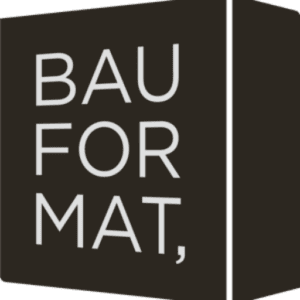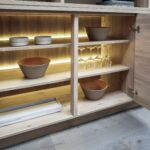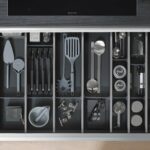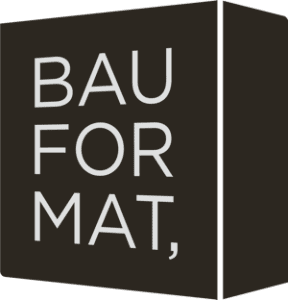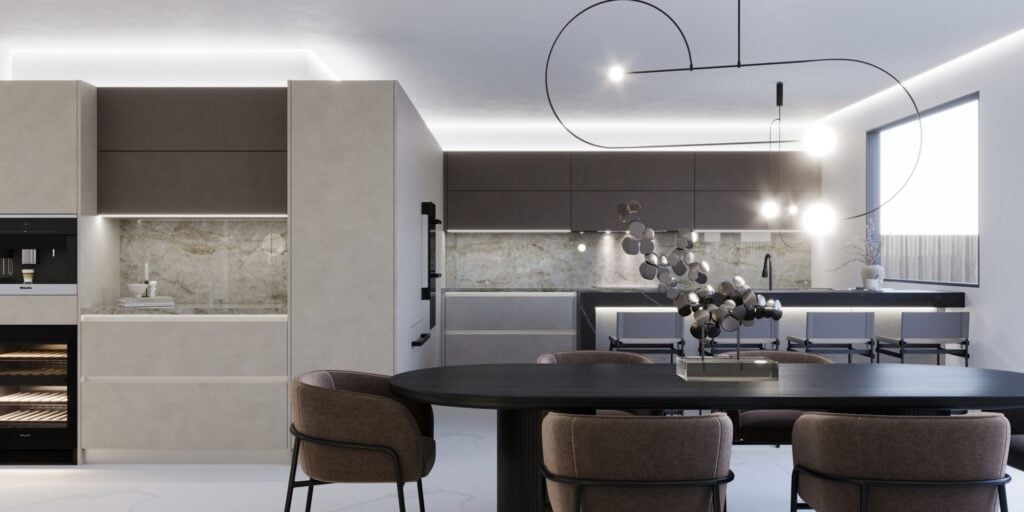
Integrating Smart Home Technology into Ultra-Modern Kitchen Cabinets with Bauformat
As the heart of the home, the kitchen is naturally positioned for technological evolution, especially with the advancements anticipated in 2024 and beyond. Smart home technology is revolutionizing kitchens by enhancing convenience and functionality and pushing the boundaries of design. Bauformat, a leader in innovative kitchen solutions, is at the forefront of integrating smart technology with ultra-modern kitchen cabinets. These integrations are not only about bringing futuristic visions to life but also making the day-to-day use of the kitchen more efficient and enjoyable.
Bauformat’s approach to smart kitchens focuses on seamlessly integrating technology with design. This means that smart features are built into the kitchen in a way that enhances the space’s aesthetics and functionality. For instance, smart refrigerators and ovens can now be managed via smartphone apps, allowing for remote monitoring and control. This integration helps streamline cooking processes and meal planning, transforming the kitchen into a center of convenience and efficiency.
Smart appliances are a significant aspect of Bauformat’s modern kitchen designs. These appliances include advanced sensors and software to predict maintenance needs and optimize energy consumption. For example, a smart oven can adjust its cooking temperature and time based on the type of dish being prepared, ensuring perfect results every time. Similarly, smart refrigerators can track expiration dates and help manage grocery inventories, significantly reducing waste.
Lighting plays a crucial role in the functionality and ambiance of a kitchen, and Bauformat’s smart kitchen designs incorporate intelligent lighting systems. These systems adjust brightness based on the time of day or the task at hand, improving energy efficiency and providing optimal lighting for cooking and socializing. This kind of responsive technology not only saves energy but also enhances the user experience by adapting to the needs of the moment.
Bauformat is committed to sustainability, a crucial aspect of modern kitchen technology. The company uses materials and technologies that minimize the environmental impact of their kitchens. For example, the energy-efficient appliances and LED lighting systems used in their designs help reduce the carbon footprint of a household. Additionally, Bauformat ensures that all materials used are durable and recyclable, supporting the lifecycle of the products and promoting a sustainable home environment.
Smart home technology in kitchens enhances not only convenience and functionality but also pushes the boundaries of design. Bauformat, a leader in innovative kitchen solutions, is at the forefront of integrating smart technology with ultra-modern kitchen cabinets. These integrations are shaping the future of smart kitchens, making cooking and kitchen management more efficient and enjoyable.
Enhanced Connectivity and Control
Enhanced connectivity in smart kitchens is revolutionizing how we manage and interact with our culinary spaces. Bauformat cabinets are at the forefront of this innovation, designed to integrate seamlessly with IoT (Internet of Things) devices. This integration allows homeowners to control various aspects of their kitchen remotely, transforming everyday kitchen routines into streamlined, efficient processes. Through apps on smartphones or tablets, users can adjust settings, monitor appliance statuses, and receive notifications about their kitchen appliances without needing to be physically present.
The ability of Bauformat cabinets to connect with IoT devices is facilitated by built-in technology that communicates with Wi-Fi or Bluetooth. This connectivity means that devices such as smart refrigerators, ovens, and smart lighting systems can be controlled via voice commands or remotely through mobile applications. For example, a homeowner could preheat their oven while still on their commute home or adjust their kitchen lighting from the comfort of their living room. This level of control not only adds convenience but also enhances the usability of the kitchen.
IoT integration helps in maintaining the longevity and efficiency of appliances through features like predictive maintenance. Sensors in the appliances can detect and report performance issues before they escalate into serious problems. This proactive approach ensures that all kitchen devices are operating optimally, reducing the risk of unexpected breakdowns and the inconveniences they bring.
Energy management is another significant benefit of connected kitchens. Smart appliances can monitor energy usage and make adjustments to operate at times when electricity rates are lower, or when less strain is placed on the grid. This not only helps in reducing utility bills but also supports broader environmental efforts by minimizing the overall energy consumption of the home.
The security and safety features enhanced by IoT are particularly noteworthy. Smart kitchens can include smoke detectors, carbon monoxide monitors, and other safety devices that alert homeowners on their mobile devices in case of emergencies. Additionally, smart locks for kitchen cabinets can keep dangerous items out of reach of children, adding an extra layer of safety to the home environment.
Smart Refrigeration
Imagine a smart refrigerator that alerts you when you’re low on essential ingredients or suggests recipes based on what’s inside. Bauformat cabinets can be designed to incorporate this technology that connects to your smartphone or tablet, enhancing your daily routine by making your kitchen smarter.
Integrated Appliances
Voice-activated and smartphone-integrated kitchen appliances like ovens, microwaves, and coffee makers represent the pinnacle of modern kitchen technology, moving beyond mere convenience to redefine the culinary landscape. Brands like Bauformat are pioneering this integration, offering customizable cabinetry that not only houses these smart appliances but also enhances the kitchen’s visual harmony. By incorporating these appliances into Bauformat’s sleek, tailor-made designs, homeowners can achieve a seamless blend of functionality and style, where technology complements form without overpowering it.
The strategic placement of smart appliances within Bauformat cabinetry is guided by principles of ergonomic design and user convenience. For example, a voice-activated oven can be positioned at an ideal height within custom cabinetry to avoid bending, making it accessible for all users. This design philosophy extends to ensuring that these appliances are easily reachable via voice command or smartphone, optimizing the flow of kitchen activities. Integrating technology in this manner not only simplifies the cooking process but also adheres to aesthetic principles, maintaining clean lines and uncluttered surfaces that are hallmarks of modern kitchen design.

Smart Coffee Maker and Smart Dishwasher
Smart kitchen appliances, when seamlessly integrated into the modern Bauformat cabinet systems, transform the culinary landscape by enhancing both efficiency and user experience. Consider the smart coffee maker—a device that exemplifies precision. It uses advanced brewing technology to adjust the temperature, brew strength, and grind size, ensuring each cup of coffee is crafted to personal preferences. The integration with Bauformat cabinets saves counter space and contributes to a streamlined kitchen aesthetic, appealing to minimalistic design sensibilities. This appliance becomes more than mere convenience; it serves as a personal barista, ready at the touch of a button.
In the realm of cleanliness and organization, the smart dishwasher stands out. Engineered to be more than just a dish cleaner, it boasts features like load sensing, water efficiency, and programmable settings, which adapt to the quantity and type of dishes. Its integration within Bauformat cabinets means it is discreetly tucked away, maintaining the sleek lines of the kitchen’s design. The smart dishwasher cleans with superior efficiency and helps in energy conservation, aligning with eco-friendly practices that are increasingly important to today’s consumers. This aligns with a broader trend in smart home technology, prioritizing aesthetics and functionality, making everyday tasks simpler and environmentally conscious.
These innovations reflect a significant shift in kitchen dynamics, focusing on automation and smart technology to cater to the fast-paced lifestyles of modern homeowners. By embedding such appliances in Bauformat cabinets, the kitchen becomes not only a place of culinary creation but also a hub of smart technology. This integration is crucial for manufacturers and designers who aim to meet the growing demand for stylish and smart homes. As these technologies evolve, they offer significant advantages in space management, energy efficiency, and personalized user experiences, marking a new era in kitchen design that is both smart and chic.
Smart Gadgets and Kitchen Layout
The evolution of smart technology is revolutionizing kitchen layouts by seamlessly integrating functionality with style. At the heart of this transformation are smart gadgets that are designed not only to optimize space but also to enhance the culinary experience. For instance, intelligent refrigerators can now suggest recipes based on the ingredients they contain, while smart ovens allow remote monitoring and control, ensuring that meals are perfectly cooked every time. These innovations are crucial for modern households, where efficiency and connectivity are pivotal in daily life.
The strategic placement of these gadgets can significantly influence the overall efficiency of kitchen operations. Smart islands equipped with integrated scales and cutting surfaces enable real-time nutritional tracking and portion control, directly feeding data into health management apps. This configuration supports a holistic approach to food preparation, where technology assists in achieving dietary goals. Additionally, voice-activated devices can control lighting, music, and appliance temperatures, creating an adaptable environment that responds to the specific needs of each user.
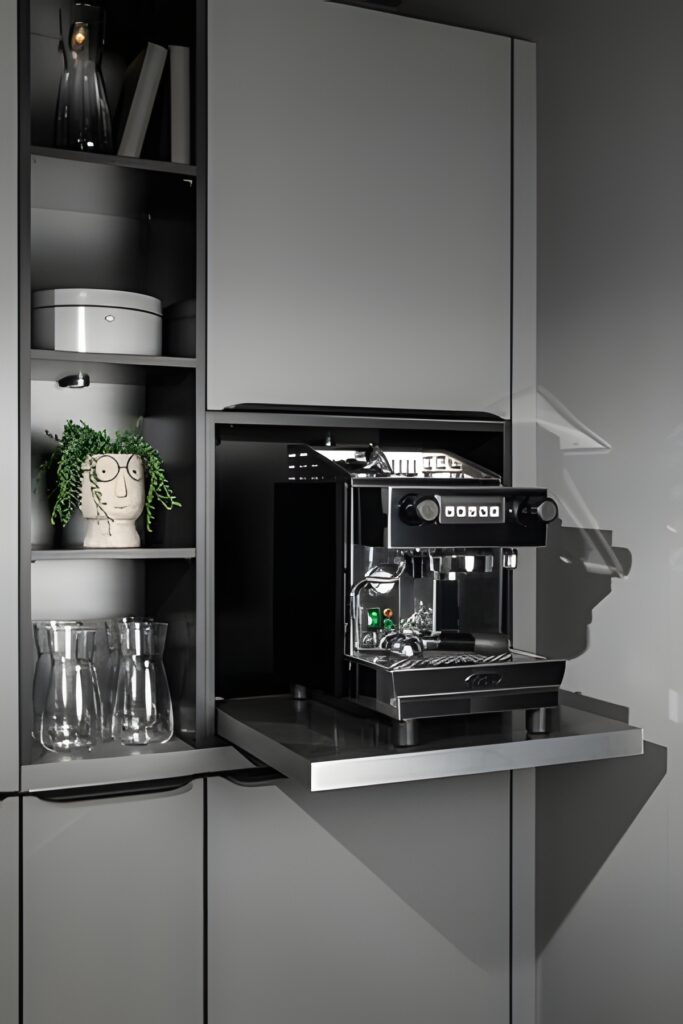
Smart Storage Solutions
Efficient use of space is pivotal in modern kitchens, where every square inch counts. Bauformat’s smart storage solutions are at the forefront, utilizing advanced technology to simplify organization and access. These innovations are designed to accommodate the dynamic nature of today’s culinary spaces, ensuring that efficiency and style go hand in hand.
Bauformat employs motorized shelves that make storage easy. These shelves can be raised or lowered with a simple command, making reaching items stored in high or deep cabinets effortless. This feature is especially beneficial in kitchens where space is at a premium, allowing for high shelves to be fully utilized without needing step stools or unnecessary stretching.
Another smart storage feature is sensor-based lighting within the cabinets. These lighting solutions automatically illuminate the interior of cabinets when doors are opened or when movement is detected. This improves visibility and enhances energy efficiency by ensuring lights are only on when needed. Sensor-based lighting helps users quickly locate items in the kitchen, reducing time spent searching and increasing the time available for meal preparation.
Bauformat also integrates customizable drawer organizers that can be adjusted to fit various utensil sizes and shapes. This adaptability allows for a more organized storage system that can evolve with the homeowner’s needs, whether they’re storing large pots, numerous baking utensils, or delicate china. By keeping everything in its designated place, these organizers prevent clutter and streamline cooking processes.
Bauformat offers pull-out cabinets equipped with smart technology. These units feature automatic opening systems activated by a gentle push or a voice command, facilitating access without the need to handle knobs or pulls. This is particularly useful when your hands are full or dirty, making kitchen work more hygienic and efficient.
The integration of smart inventory management systems into Bauformat’s cabinetry is transforming how ingredients are tracked and managed. These systems monitor stock levels and provide updates to homeowners through mobile apps or integrated kitchen displays. They can alert you when supplies are low or when items are nearing their expiration dates, aiding in meal planning and shopping.
Motorized Shelves
Motorized shelves represent a transformative innovation in kitchen design, addressing both accessibility and efficiency within modern home environments. As urban living spaces become more compact and demand smarter storage solutions, these shelves offer a practical response. Powered by simple mechanisms such as electric motors and controlled via remotes or smartphone apps, these systems allow shelves in high or deep cabinets to descend or extend at the touch of a button. This technology is not only a convenience but a necessity for individuals with mobility challenges or those who frequently use heavy or bulky items that are difficult to retrieve from standard cabinets.
The functionality of motorized shelves extends beyond mere convenience; it enhances safety and ergonomics in the kitchen. Traditional storage often requires stretching, climbing, or bending awkwardly, which can lead to strain or injury. Motorized shelves eliminate the need for such physical exertion, allowing users to access items safely and comfortably. The shelves can be adjusted to an ideal height that suits the user’s level, reducing the risk associated with handling items stored out of reach. This feature is particularly beneficial for the elderly, people with disabilities, or anyone who might find the physical strain of reaching or bending problematic.
Sensor-Based Lighting
Sensor-based lighting systems, seamlessly integrated within cabinetry, represent a pinnacle of modern kitchen design. As doors swing open or motion is detected, these intelligent systems activate, casting light precisely where needed. This feature, rooted in the principle of reactive illumination, bypasses the need for manual switches, streamlining kitchen operations and ensuring that visibility is optimized without delay. The implementation of such technology not only enhances the functionality of a space but also adheres to environmental consciousness by conserving energy. This dual advantage aligns well with contemporary values of efficiency and sustainability, making it an attractive feature for eco-conscious homeowners.
The rationale behind integrating motion-detecting lighting into cabinetry hinges on its ability to improve safety and convenience. In the heart of the home—the kitchen—where precision and care are paramount, adequate lighting is essential. These systems mitigate the risk of accidents caused by poor visibility, such as mishandling knives or other kitchen tools. The automatic nature of these lights ensures that no energy is wasted, as they are programmed to turn off when no movement is detected. This smart approach not only conserves energy but also extends the life of the lighting systems, reducing the need for frequent replacements and maintenance.
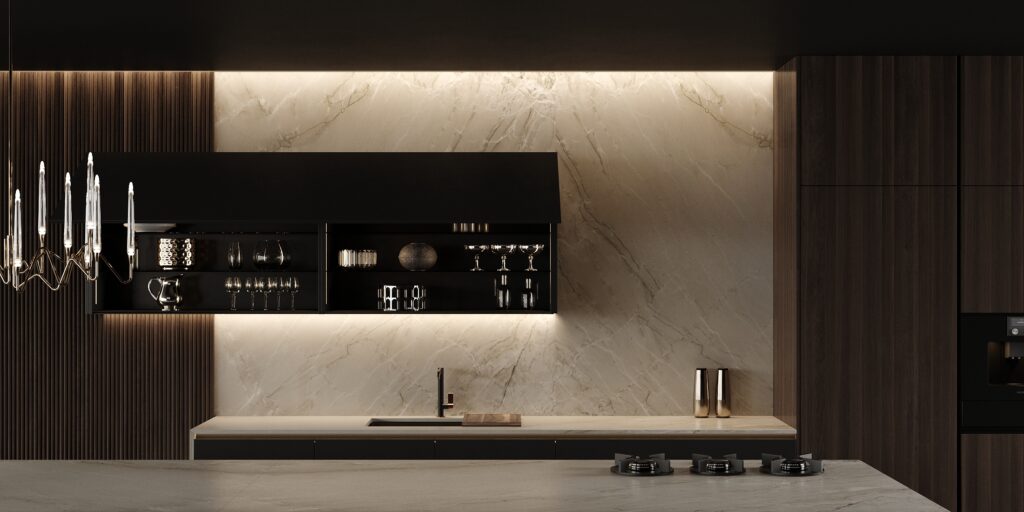
Customizable Storage Options
Bauformat, a leader in kitchen design, excels in crafting bespoke storage solutions that adapt seamlessly to individual preferences and spatial requirements. This flexibility is not merely about aesthetics but is deeply rooted in functionality:
- Smart Kitchen Integration: Bauformat harnesses cutting-edge technology to enhance kitchen usability. Features, like integrated weighing scales, appliance garages for small devices, and built-in spice dispensers, ensure essentials are neatly organized and within easy reach. These smart-systems empower homeowners by saving time and reducing clutter, optimizing the culinary workflow.
- Custom Shelving and Cabinets: The adaptability extends to physical structures. Bauformat offers custom shelving options designed to accommodate unique kitchen gadgets and utensils. For instance, adjustable shelves make it easy to store tall appliances like stand mixers or espresso machines, while pull-out cabinets can be fitted with custom racks for storing everything from wine glasses to heavy pots. This specificity in design caters to the diverse culinary tools one might possess, ensuring every item has a designated spot that reflects its frequency of use and functional necessity.
- Personalized Organization: Tailoring storage solutions to the exact dimensions and style of your kitchen ensures a harmonious environment where form meets function. Whether it’s a corner drawer system designed to maximize space in small kitchens or bespoke pantry units crafted for easy access to ingredients, Bauformat’s approach focuses on making the kitchen a versatile and welcoming space for cooking and socializing.
These customizations not only elevate the kitchen’s visual appeal but also significantly enhance usability, promoting a more efficient and enjoyable cooking experience. Through these intelligent design elements, Bauformat stands at the forefront of kitchen innovation, offering solutions that are both practical and stylish, aligned with the principles of modern home design and user experience.
Integrated Smart Kitchen Islands
Integrated bright kitchen islands represent a transformation in kitchen design, merging aesthetics with multifunctional technology to enhance convenience and functionality. Modern, bright kitchens leverage these islands as a physical centrepiece and a technological hub. Brands like Bauformat are at the forefront, directly embedding advanced features such as built-in charging stations and intelligent scales into the kitchen island. These features support the modern lifestyle where connectivity and accessibility are paramount, ensuring devices are charged and ready while offering precise measurements for culinary adventures, all within arm’s reach.
Technology integration within kitchen islands is driven by a demand for kitchens that are not only spaces for cooking but also for social interaction, work, and family life. With built-in charging stations, homeowners can keep their devices powered and integrated into their daily routines without cluttering space. Smart scales enhance this environment by facilitating nutritional awareness and precise cooking methods, appealing to health-conscious individuals and culinary enthusiasts alike. This holistic approach to kitchen design reflects a broader trend in home automation, where efficiency and enhanced living quality are prioritized.
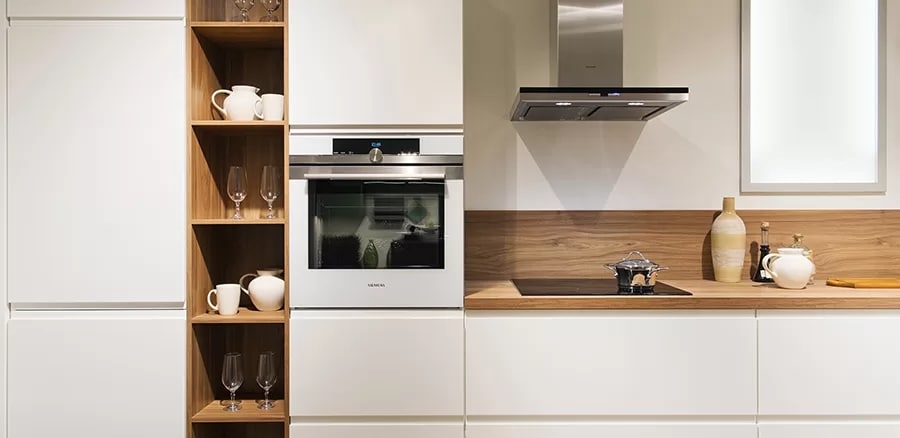
Eco-Friendly Tech Features
Sustainability is increasingly becoming a cornerstone in kitchen design, reflecting a broader commitment to environmental responsibility. Bauformat is at the forefront of this movement, integrating eco-friendly technologies into their kitchens that go beyond mere functionality to also ensure minimal environmental impact. This focus is evident in their choice of materials, energy-efficient appliances, and waste-reduction strategies.
Bauformat selects materials not only for their durability and aesthetic appeal but also for their environmental credentials. The company uses sustainably sourced woods, recycled metals, and composites that have a lower ecological footprint. These materials are chosen for their ability to be recycled at the end of their lifecycle, thus minimizing waste and reducing the need for virgin raw materials. By prioritizing sustainability in their material selection, Bauformat helps ensure that the kitchens they create are as environmentally friendly as they are stylish and durable.
A key feature of Bauformat’s kitchen designs is the incorporation of energy-efficient appliances. These appliances, including refrigerators, dishwashers, and ovens, are selected to meet stringent energy standards such as the ENERGY STAR rating, which signifies superior energy efficiency. By using less energy, these appliances help reduce the kitchen’s overall carbon footprint, lower utility bills, and conserve natural resources, contributing significantly to a more sustainable kitchen environment.
Bauformat’s commitment to sustainability extends to waste reduction. The company designs kitchens with systems that facilitate sorting and recycling of waste products. Compartments for separating glass, plastics, and organics are incorporated into the cabinetry, making recycling more accessible and less time-consuming for homeowners. Additionally, Bauformat advocates for the use of composting systems that turn organic waste into valuable compost, further reducing the amount of waste sent to landfills.
Water conservation is another aspect of the sustainable kitchens crafted by Bauformat. Faucets and dishwashers in Bauformat kitchens are equipped with advanced technology to reduce water usage without compromising performance. These features include aerators and sensors that regulate water flow based on usage needs, effectively decreasing water waste and helping to preserve this vital resource.
Bauformat integrates smart home technology to enhance energy management in the kitchen. Smart systems can monitor and control the energy consumption of appliances and lighting, ensuring that energy is used efficiently. Homeowners can adjust settings via smartphone apps to optimize energy use throughout the day, aligning with times when renewable energy availability is higher or utility rates are lower. This not only saves energy but also integrates the kitchen into a broader smart home ecosystem focused on sustainability.
Energy-Efficient Components
Bauformat cabinets seamlessly integrate cutting-edge, energy-efficient appliances, supporting a significant reduction in the kitchen’s carbon footprint. By adhering to rigorous standards, these appliances minimize energy consumption while maintaining peak performance. This approach not only caters to the eco-conscious consumer but also aligns with global energy conservation goals. The inclusion of such technologies reflects a commitment to sustainability, a critical aspect increasingly valued by homeowners. This integration fosters an environmentally friendly kitchen setup that does not compromise on functionality or style.
The rationale behind choosing energy-efficient appliances extends beyond environmental benefits; it also encompasses economic advantages. Lower energy consumption means reduced utility bills, providing long-term savings to the consumer. These appliances often come with enhanced durability and advanced technological features, such as programmable settings and smarter resource management. This efficiency is achieved through innovations like improved insulation, energy-efficient motors, and LED lighting, which significantly decrease unnecessary energy drain. By investing in these smart appliances, homeowners gain a dual advantage—contributing to a healthier planet and enjoying cost savings.

Recyclable Materials
Bauformat takes pride in fostering a “cooking space” that does more than just serve its basic function; it innovates in ways that enhance both aesthetic appeal and ecological responsibility. By selecting sustainable materials for countertops, cabinetry, and kitchen faucets, Bauformat ensures that the components of your modern kitchen are recyclable. This approach is crucial because it reduces the environmental burden and promotes a lifecycle of reuse, aligning with stringent global sustainability benchmarks. Choosing materials that can be processed back into useful products not only minimizes waste but also supports the circular economy—a key aspect of sustainable development.
Creating a smart kitchen extends beyond integrating technology; it involves conscientious material selection that impacts the long-term viability and environmental footprint of the space. Smart kitchen features such as energy-efficient appliances and sustainable materials like bamboo or recycled steel for countertops contribute to this goal. Bauformat’s commitment is evident in their choice of materials that ensure durability without compromising on recyclability. This decision is driven by the understanding that kitchens can offer more than just a place for cooking and dining; they can also be a powerhouse for environmental stewardship.
The concept of a “different kitchen” is central to Bauformat’s philosophy. It emphasizes a space that is not only equipped with smart kitchen features but is also constructed with the planet in mind. This dual focus on aesthetics and environmental impact makes Bauformat a leader in the kitchen design industry. By fostering a cooking and dining experience that prioritizes sustainability, Bauformat helps customers create a smart kitchen that is both functional and forward-thinking. Their commitment to recyclable materials not only meets current demands for eco-friendly living spaces but also sets a precedent for future innovations in kitchen design.
Smart Systems for Waste Management
In the world of modern kitchen design, the integration of smart systems for waste management is not just a trend but a crucial element in promoting sustainability. Bauformat kitchens are at the forefront of this innovation, embedding advanced waste and recycling management systems directly into their cabinetry. This seamless integration ensures that the functionality does not disrupt the aesthetic harmony of the kitchen space. These systems are designed to sort and manage waste efficiently, from organic composting to recycling processes, aligning with the needs of environmentally conscious homeowners. The benefit of this integration is twofold: it promotes eco-friendly practices and enhances the convenience of managing waste, making it effortless for users to contribute to environmental sustainability.
Why Integrated Waste Management Systems Are Essential
The necessity for integrated waste management systems stems from an increasing awareness of the environmental impacts associated with waste disposal. Traditional methods of waste handling often lead to inefficient separation and processing of recyclable materials, which can contribute to higher levels of pollution and resource depletion. By incorporating advanced systems within the kitchen cabinetry, Bauformat addresses these issues head-on. These systems encourage the proper separation of waste at the source, which is crucial for effective recycling and waste management. Moreover, they reduce the footprint of waste processing equipment and the need for external bins, which can clutter kitchen spaces and detract from design aesthetics.
How Bauformat Leads with Eco-Friendly Innovation
Bauformat’s commitment to eco-friendly innovation is demonstrated through its use of cutting-edge technology and sustainable materials in constructing kitchen solutions that offer both functionality and environmental stewardship. The integration of smart waste management systems into kitchen design is a reflection of Bauformat’s dedication to sustainability. This approach not only helps reduce landfill waste but also educates users on the importance of waste sorting and recycling, fostering a more environmentally aware household. By merging technology with practical design, Bauformat kitchens empower users to effortlessly maintain a green lifestyle, making a significant impact on environmental conservation efforts.
To underline this commitment, here are some of Bauformat’s notable certifications and awards:
- ISO 14001 Certification: Demonstrates Bauformat’s compliance with international environmental management standards, ensuring that their operations and processes minimize environmental impact.
- GreenGuard Gold Certification: This certification signifies that Bauformat’s products meet rigorous low emissions standards, contributing to healthier indoor air quality.
- The Blue Angel Eco-Label: Awarded to Bauformat for using materials that are environmentally friendly and sustainable, setting high standards for ecological product design.
- German Design Award 2021: Recognizes Bauformat’s innovation in eco-friendly kitchen design, emphasizing aesthetics alongside functionality and sustainability.
Water-Saving Faucets
Bauformat, a pioneer in blending luxury with sustainability, introduces water-saving smart faucets as an integral feature of their eco-friendly kitchens. These innovative faucets employ advanced technology to monitor and adapt to individual water usage patterns, ensuring optimal efficiency. By integrating sensors that detect the duration and frequency of water use, the faucets can adjust the flow rate accordingly, minimizing unnecessary water expenditure. This feature conserves water and reduces household utility costs, reinforcing Bauformat’s commitment to eco-conscious living.
The functionality of these smart faucets extends beyond simple water savings. They are designed to maintain user comfort and convenience, proving that environmental responsibility does not require a compromise in quality. The adaptive flow technology ensures that water pressure and temperature are consistent, providing a seamless experience for the user. This is crucial in maintaining the high standards expected in luxury kitchens, where design and functionality must coexist without sacrificing the sustainable ethos that Bauformat champions.
Frequently Asked Questions
What are the key features of a smart kitchen for 2024?
Smart kitchens in 2024 will include smart appliances, smart lighting systems, and advanced kitchen technology that integrates with devices like Alexa or Google Home to enhance functionality and convenience.
How can smart home technology transform your traditional kitchen into a smart one?
Integrating smart home technology such as smart fridges, smart lighting, and AI-driven kitchen devices can turn a traditional kitchen into a smart culinary space, improving efficiency and making cooking more enjoyable.
What advantages of modern smart kitchen designs can homeowners expect?
Homeowners can look forward to enhanced connectivity, improved energy efficiency, and customizable kitchen tools that make daily tasks simpler and transform the kitchen into a smart hub for the home.
What are the upcoming kitchen trends in 2024 for smart appliances?
The trends for 2024 include integrated smart kitchen devices that offer more control and connectivity, energy-efficient designs, and sleek, modern kitchen aesthetics that blend seamlessly with the rest of the home.
How do smart cabinets enhance the functionality of modern kitchens?
Smart cabinets can feature automated shelves, smart lighting that activates on opening, and smart kitchen tools storage solutions that help maintain organization and accessibility in your culinary space.
What should I consider when choosing kitchen lighting for a smart kitchen?
Consider smart lighting systems that adjust the brightness based on the time of day or activity in the kitchen, enhancing both the interior design and functionality of your kitchen smart setup.
How does integrating smart appliances like a smart fridge benefit my daily routine?
A smart fridge can track your groceries, suggest recipes, and integrate with other smart kitchen devices to streamline your meal preparation and ensure you make the most of your groceries.
What are the benefits of converting my kitchen into a smart one?
Converting your kitchen includes benefits like enhanced kitchen smart efficiency, better energy management, and a more personalized cooking experience, making your dining area more adaptable to modern needs.
Can smart kitchen technology reduce the environmental impact of my kitchen?
Yes, using smart kitchen technology, such as energy-efficient smart appliances and smart air systems, can significantly reduce the environmental impact by optimizing energy use and reducing waste.
How does the future of cooking look with Bauformat’s smart kitchen solutions?
The future of cooking with Bauformat includes AI-enhanced cooking assistance, smart kitchen trends that focus on sustainability and connectivity, and designs that make kitchens the central hub of technologically savvy homes.
What role do smart kitchen tools play in modern kitchen designs?
Smart kitchen tools play a crucial role in modern designs by adding convenience and functionality, allowing for more precise cooking and easier management of kitchen tasks.
How can I transform your traditional kitchen with Bauformat’s smart solutions?
Transform your kitchen by integrating Bauformat’s smart solutions like smart faucets, smart appliances, and smart lighting systems that can be controlled via voice or mobile applications.
What smart kitchen devices should I look for in 2024?
In 2024, look for smart kitchen devices that offer seamless integration with home assistants, have self-cleaning features, and provide interactive cooking guides to enhance your kitchen smart experience.
How do smart kitchens also enhance the dining area?
Smart kitchens enhance the dining area by facilitating a smoother transition from cooking to dining with features like mood lighting, automated meal preparation, and synchronized music systems, all controlled through smart home platforms.
What kitchen trends in 2024 should I consider when designing a luxury kitchen?
For a luxury kitchen, consider trends like high-tech smart kitchen appliances, sophisticated interior design elements, and smart kitchen technology that not only looks stunning but also offers top-tier functionality and efficiency.
The Future is Now
The kitchen of 2024 represents a blend of style, functionality, and technology. With Bauformat at the helm, integrating smart home technology into ultra-modern kitchen cabinets not only enhances the cooking experience but also paves the way for a more connected and sustainable home environment. As we look towards the future, the possibilities for what a smart kitchen can achieve are virtually limitless, driven by ongoing innovations and a commitment to excellence from leaders like Bauformat.
- Modern Smart Kitchen: Bauformat’s integrations make cooking and kitchen management highly efficient and enjoyable.
- Advancements in Smart Kitchen Equipment: Looking forward to 2024 kitchen trends, the expected innovations in smart kitchen appliances and gadgets suggest a future where kitchens are not only places of culinary activity but also central to a home’s connectivity and efficiency.
- Integration of Smart Technology: The seamless integration of technology into Bauformat kitchen cabinets sets a new standard for what modern kitchens are designed to offer, making every aspect of kitchen use easier and more enjoyable.
- Future of Cooking and Kitchen Management: With Bauformat, the future is bright for those who value both aesthetics and functionality in their kitchen, offering a preview into the advanced capabilities of tomorrow’s culinary spaces.
As we look to 2024 and beyond, Bauformat is not just keeping up; it’s setting the pace, defining the modern smart kitchen as a place where technology, design, and sustainability meet to create an extraordinary daily experience.
| Entity Name | Description | Source Link |
|---|---|---|
| Smart device | A smart device is an electronic device, generally connected to other devices or networks via different wireless protocols such as Bluetooth, NFC, Wi-Fi, LiFi, etc., that can operate to some extent interactively and autonomously. Examples include smartphones, smart TVs, smart speakers, and smart home devices. | source |
| Automation | Automation involves the use of various control systems to operate equipment such as machinery, processes in factories, boilers, heat-treating ovens, switching in telephone networks, steering and stabilization of ships, aircraft, and other applications with minimal or reduced human intervention. | source |
| Refrigerator | A refrigerator is a home appliance designed to store food at a temperature below room temperature. It helps preserve food by slowing down the growth of bacteria. A refrigerator typically includes a freezer section for keeping food frozen. | source |
| Wi-Fi | Wi-Fi is a wireless local area networking technology with devices based on the IEEE 802.11 standards. Wi-Fi is a trademark of the Wi-Fi Alliance, which restricts the term Wi-Fi Certified to products that complete interoperability certification testing. | source |
| Bluetooth | Bluetooth is a wireless technology standard for exchanging data between fixed and mobile devices over short distances using short-wavelength UHF radio waves in the ISM band from 2.400 to 2.485 GHz and building personal area networks (PANs). | source |
| Smart system | An intelligent system is an advanced setup capable of autonomous operation in complex environments. It uses artificial intelligence, machine learning, and big data analytics to deliver thoughtful and adaptive functionalities. These systems are often used in smart homes, automation, and intelligent control. | source |
| Home appliance | Home appliances are electrical/mechanical machines that accomplish hold functions, such as cooking, cleaning, or food preservation. They are divided into small appliances, major appliances, or white goods, and consumer electronics, or brown goods. | source |
| Home automation | Home automation is part of the “Internet of Things,” IoT. The way devices and appliances can be networked to provide seamless control over all aspects of your home and more. This automation can include the scheduling and automatic operation of heating, ventilation, air conditioning, etc. | source |
| Speech recognition | Speech recognition is an interdisciplinary subfield of computational linguistics that develops methodologies and technologies for enabling computers to recognize and translate spoken language into text. It is also known as automatic speech recognition (ASR), computer speech recognition, etc. | source |
| Artificial intelligence | Artificial intelligence (AI) is intelligence demonstrated by machines, in contrast to the natural intelligence displayed by humans and animals. It includes the study of algorithms that allow computers to perform cognitive functions such as learning, reasoning, and problem-solving. | source |
| Countertop | A countertop (also counter top, counter, benchtop, (British English) worktop, or (Australian or New Zealand English) kitchen bench) is a flat surface or worktop, typically found in kitchens or food preparation areas, bathrooms or lavatories, and workrooms in general. | source |
| Cabinetry | Cabinetry refers to the craft of making cabinets, which are typically made of wood or synthetic materials and are used for storage and often for holding appliances or items for display. Cabinets are a vital kitchen design element used in bathrooms and other home areas. | source |
